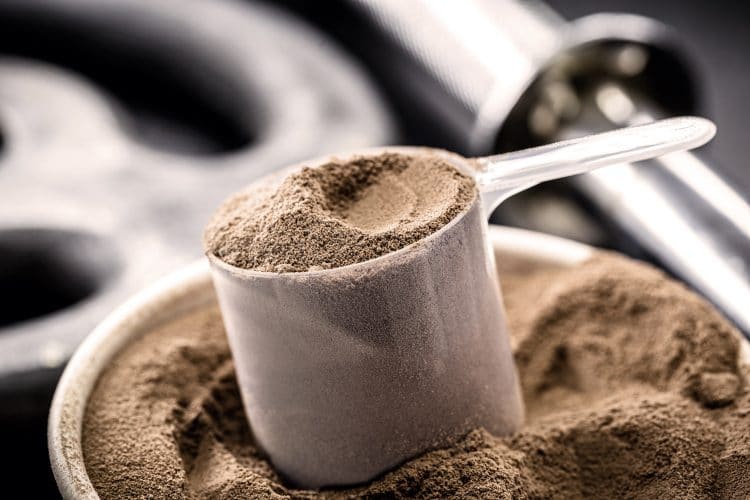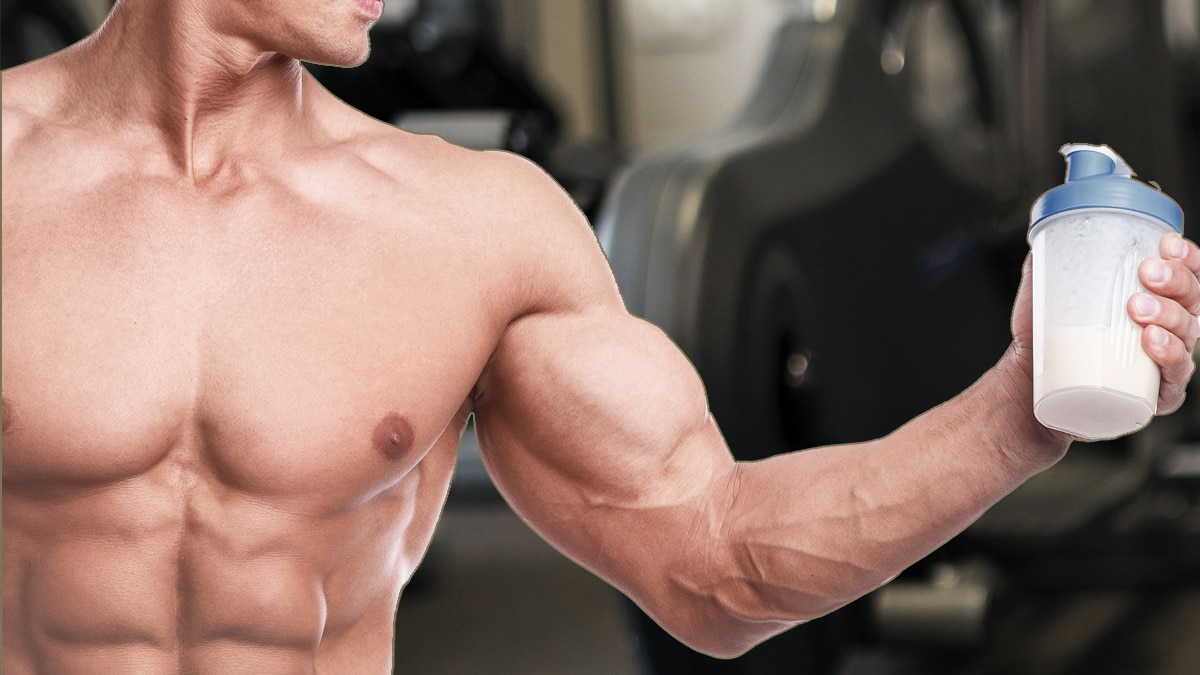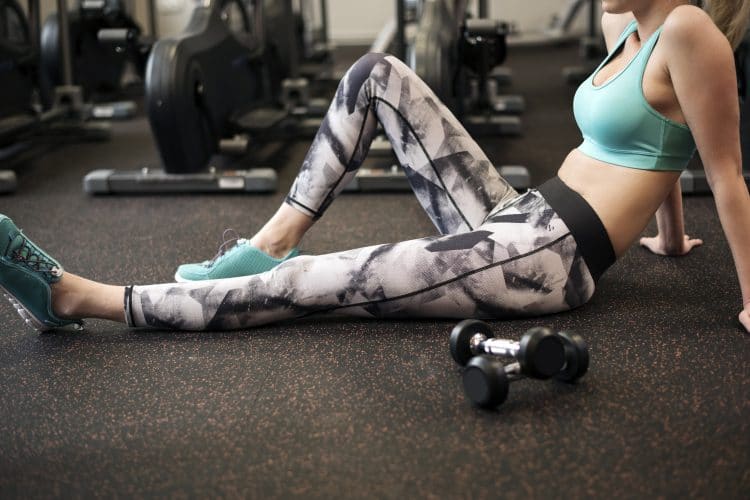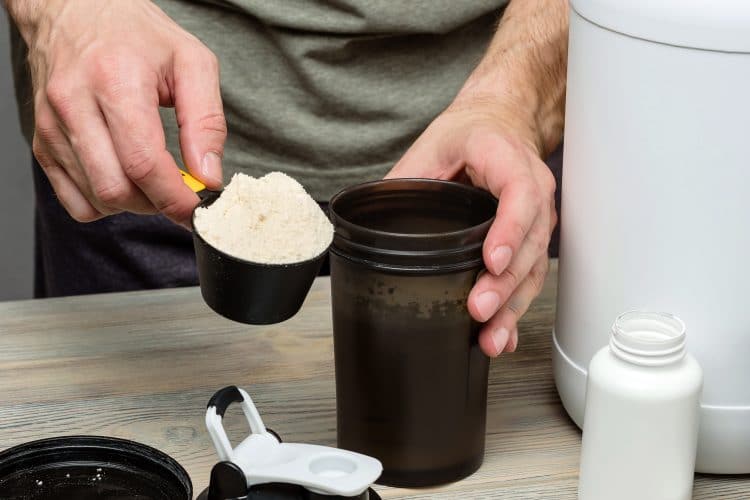“Will I lose muscles if I stop taking whey protein?” is probably the first thing that comes to mind if you’ve been using a whey protein supplement in your muscle-building routine but plan on stopping the practice soon.
The simple answer to the question is no. You will not lose muscles if you stop using whey protein.
However, a lot depends on your calorie and macronutrient intake and fitness regimen after you stop taking it. Your muscle size will also depend on how you manage your daily protein intake without a supplement.
With that out of the way, let’s understand more about whey protein, when you should stop it, and tips on maintaining muscle mass and conditioning after cutting out protein supplements from your routine.
A Word on Whey Protein
Whey is derived during the cheesemaking process. After milk passes quality tests, added enzymes help separate the curd from the liquid whey. The liquid whey is then pasteurized, and protein is concentrated and isolated. The final product is spray dried into a powder form.
To learn more about the whey protein production process, check out the video below:
But why do people take whey protein?
Proteins are one of the building blocks of body tissue and are essential for maintaining muscle and tendon health. Proteins also help in muscle repair, especially after a workout. (1)
So, consuming adequate protein is vital for building muscle. Experts suggest you need one gram of protein per kilogram of body weight. Your protein intake may be higher if you indulge in moderate to high-intensity workouts.
While you can get protein from food, it might not always be possible to get the necessary amount for building muscle mass just from your diet. Taking a supplement, such as a whey protein powder, is a convenient way to boost your daily protein consumption.
A whey protein supplement can be a lifesaver for workout enthusiasts or people unable to meet their daily protein goals through their natural diet.
Whey protein is a darling of the fitness industry because:
- It is a high-quality protein source.
- They are fast digesting. Your muscles will instantly get the protein they need for recovery and repair.
- It is usually low in fats and carbohydrates.
When Should You Stop Taking a Whey Protein Supplement?
A whey protein supplement is usually safe and effective in most cases. However, you may decide to stop taking it for dietary or health reasons, including:
Health Problems
While whey is safe, it is best to avoid it if you have kidney or liver problems. Additionally, you should consult your physician before taking the supplement if you have other long-standing health conditions. (2)
Lactose Intolerance
Whey might also cause digestive issues such as flatulence, nausea, diarrhea, and abdominal cramps. These symptoms may be more intense in individuals with lactose intolerance. (3)
In such cases, you can reduce your daily whey protein supplement dose and replace it with dietary protein sources. Alternatively, you could switch to a plant protein supplement.
You are Getting Adequate Protein from Eating Whole Foods
It is okay to stop supplementing with whey protein if you can replace it with whole food sources high in protein, such as edamame beans, chicken breast, tuna, and Greek yogurt. The key is to consume adequate protein to reach your daily requirement to build and maintain muscle mass.
Whole foods are minimally or not processed at all. Examples of whole foods include fruits, vegetables, legumes, pulses, and whole grains. In addition to protein, they also contain carbohydrates, fats, minerals, and vitamins.
Related: Our List Of 40 Great Protein-Packed Foods
You Are Noticing Side Effects
Whey protein may cause side effects in some individuals. The most common ones include: (4)
- Acne
- Nausea
- Increased bowel movement
- Bloating
- Reduced appetite
- Headache
- Tiredness
For best practice, you should talk to a health professional if you notice any of the side effects mentioned above before continuing the use of a whey protein supplement.
Weight Gain
If you are getting adequate calories and protein from your whole food diet, adding a protein supplement may cause weight gain. Moreover, some whey protein may include added sugars that can cause bloating. (5)
Factors To Consider After Stopping the Use of a Whey Protein Supplement
The most important factors to consider after stopping the use of any protein supplement include:
Maintaining Your Protein Intake
As discussed earlier, it is crucial to meet your daily protein requirement to build and maintain your muscles. So, you need to fill the protein intake gap with whole foods after stopping using a supplement to avoid muscle loss.
For instance, if you were getting 21 grams of protein from a whey supplement, you can replace it with 4oz of chicken breast, which has a similar protein content.
If you have a busy routine, you might find it challenging to set aside time for cooking. However, once you have figured out an alternate high-quality protein source to replace the protein powder, try and assign time to meal prep.

Continuing Your Exercise Regimen
Your training schedule is as important as nutrition in maintaining or building muscle, and it is best to follow a hypertrophy-focused strength training routine to build and maintain muscle mass.
All in all, whey protein powder is a supplement and doesn’t cause muscle growth in isolation. You’ll need to lift weights while following an effective nutrition and recovery program.
Recovery Program
A balanced workout, diet, and recovery program are essential for building and maintaining muscle mass. You break down muscle tissue during training. They grow bigger and stronger while you’re resting and feeding yourself well.
Maintain a healthy and balanced diet, sleep adequately (at least eight hours a night), and keep yourself hydrated by drinking a gallon of water a day to support muscle repair and growth.
Tips To Maintain Muscles After Stopping Use of a Whey Supplement
If you have decided to stop taking a whey supplement, the following tips will help maintain your hard-earned muscles:
Calculate Your Daily Protein Requirement
Depending on your goal, you might need 1.0 to 2.2 grams of protein per kilogram of body weight. Furthermore, about 35% of your calories should come from proteins. (6)
For instance, if your body weight is 80 kilograms, you need to take 80 to 176 grams of protein. With a 1,800 daily caloric intake, you need to consume 150 grams of protein to maintain muscle mass. You can use our convenient protein calculator for personalized recommendations.
You can also calculate the required amount of protein in each meal. For instance, if you need 150 grams of protein, you could eat 50 grams in three meals spaced equally throughout the day.
Don’t Train on an Empty Stomach
Your muscles store glucose in the form of glycogen, which acts as a backup when you are running low on energy, especially on a calorie deficit diet.
However, if you’re on a carb-restrictive diet, the hormone cortisol breaks down your muscles to protect the brain and other vital organs from a lack of energy, which, as you might have guessed, is not good for building or maintaining muscle.
To avoid muscle breakdown during your workouts, you should avoid training on an empty stomach. Refueling after workouts is also essential to prevent muscle breakdown. Take protein and carbohydrates within an hour of exercise.
Related: How Long Should You Wait to Workout After Eating?
Get Adequate Sleep
Sleep allows muscles to rest, repair, and rebuild by ensuring adequate hormone production. Besides, emotional stress produces hormones that destroy your muscles. Sleep relaxes you, reduces stress, and protects your muscles.
FAQs
Can I Build Muscles Without Using a Whey Protein Supplement?
Yes. You could build — and maintain — muscle without consuming whey protein or other protein supplements. You need to be consuming 0.8 to 1 gram of protein per pound of body weight through whole foods to build muscle mass.
What Happens If I Stop Taking a Whey Protein Powder?
Nothing changes if you maintain your calorie and macro intake and follow a proven exercise and recovery regimen. If you follow these three things, you’ll neither regain the lost weight nor lose the muscles you have built.
Wrapping Up
It’s no secret that a whey protein supplement is a bodybuilder’s darling. So, when you decide to stop taking a whey protein supplement, you need to figure out a way to maintain your daily protein intake through nutrient-dense whole foods to build and maintain muscle mass.
References
Fitness Volt is committed to providing our readers with science-based information. We use only credible and peer-reviewed sources to support the information we share in our articles.
- West, D., Abou Sawan, S., Mazzulla, M., Williamson, E., & Moore, D. R. (2017). Whey Protein Supplementation Enhances Whole Body Protein Metabolism and Performance Recovery after Resistance Exercise: A Double-Blind Crossover Study. Nutrients, 9(7), 735. https://doi.org/10.3390/nu9070735
- Vasconcelos QDJS, Bachur TPR, Aragão GF. Whey protein supplementation and its potentially adverse effects on health: a systematic review. Appl Physiol Nutr Metab. 2021 Jan;46(1):27-33. doi: 10.1139/apnm-2020-0370. Epub 2020 Jul 23. PMID: 32702243.
- Silanikove, N., Leitner, G., & Merin, U. (2015). The Interrelationships between Lactose Intolerance and the Modern Dairy Industry: Global Perspectives in Evolutional and Historical Backgrounds. Nutrients, 7(9), 7312–7331. https://doi.org/10.3390/nu7095340
- WebMD. Whey Protein – Uses, Side Effects, and More. Available at: https://www.webmd.com/vitamins/ai/ingredientmono-833/whey-protein
- Harvard Health Publishing. The hidden dangers of protein powders. Available at: https://www.health.harvard.edu/staying-healthy/the-hidden-dangers-of-protein-powders
- Mayo Clinic. Nutrition and healthy eating. Available at: https://www.mayoclinic.org/healthy-lifestyle/nutrition-and-healthy-eating/in-depth/nutrition-rules-that-will-fuel-your-workout/art-20390073
Tip: If you're signed in to Google, tap Follow.











